
Budawang National Park is a national park in New South Wales, Australia, located approximately 200 kilometres (120 mi) southwest of Sydney and 25 kilometres (16 mi) north of Batemans Bay. It contains part of the Budawang Mountain Range.

Argyrodendron trifoliolatum is an Australian rainforest tree. It is native to eastern Queensland and northeastern NSW, Australia, where it is known as white booyong. Booyong, New South Wales is named after the tree. It can grow up to 45 metres tall. Its flowers, produced from July to September, are in great numbers and are creamy-colored bell-shaped. The most distinctive feature of Argyrodendron trifoliolatum is that the trunks form large characteristic buttresses.

Syzygium paniculatum, the magenta lilly pilly or magenta cherry, is a species of flowering plant in the myrtle family Myrtaceae, native to New South Wales, Australia. A broad dense bushy rainforest tree, in cultivation it grows to a height of 15 m (49 ft) with a trunk diameter up to 35 cm (14 in). The largest known example is at Ourimbah Creek, 35 m (115 ft) metres tall. The leaves are 3–9 cm (1.2–3.5 in) long, opposite, simple and slightly obovate, tapering at the leaf base. They are dark glossy green above, and paler below. White flowers are produced in clusters. The edible fruit is usually magenta, but can be white, pink or purple.
Triunia is a genus of medium to tall shrubs or small trees found as understorey plants in rainforests of eastern Australia. Members of the plant family Proteaceae, they are notable for their poisonous fleshy fruits or drupes. Only one species, T. youngiana, is commonly seen in cultivation.

Grevillea hilliana, of the plant family Proteaceae, is a species of Australian endemic trees known by many common names including white yiel yiel, white silky oak, grey oak, Hill's silky oak, and yill gill.
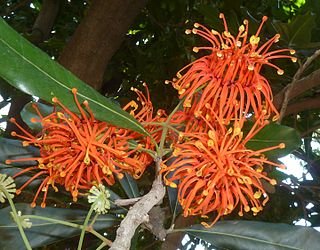
Stenocarpus sinuatus, known as the firewheel tree, is an Australian rainforest tree in the Proteaceae family. The range of natural distribution is in various rainforest types from the Nambucca River in New South Wales to the Atherton Tableland in tropical Queensland. Stenocarpus sinuatus is widely planted as an ornamental tree in other parts of Australia and in different parts of the world.

Numinbah Nature Reserve is a protected nature reserve that is located in the Northern Rivers region of New South Wales, in eastern Australia. The reserve was gazetted in December 1981 with a further addition made in 1989 to make the reserve to its current area of 858 hectares. The reserve is situated north-east of the rural locality of Numinbah, and south of the Queensland town of Springbrook and defines part of the state border between New South Wales and Queensland.
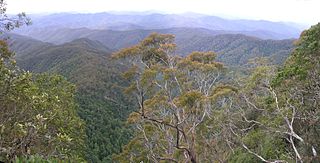
The Eastern Australian temperate forests is a broad ecoregion of open forest on uplands starting from the east coast of New South Wales in the South Coast to southern Queensland, Australia. Although dry sclerophyll and wet sclerophyll eucalyptus forests predominate within this ecoregion, a number of distinguishable rainforest communities are present as well.

The Yatteyattah Nature Reserve is a protected nature reserve in the south coast region of New South Wales, in eastern Australia. The 35-hectare (86-acre) reserve is situated near Milton.
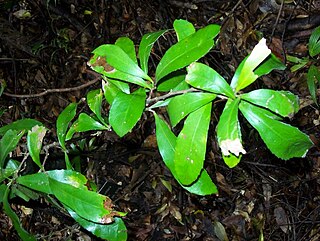
Helicia glabriflora is a species of rainforest shrubs or small trees occurring in eastern Australia. Common names include smooth or pale helicia, pale, leather or brown oak. They grow naturally in a variety of different rainforest types from the Illawarra, New South Wales to the Townsville area, Queensland. Of all the global diversity of approximately one hundred Helicia species, this one species naturally grows the furthest south, in the Minnamurra Rainforest and the Robertson area, Illawarra, New South Wales, there observed more on the relatively fertile basalt and alluvial soils.

The Robertson Nature Reserve is a protected rainforest nature reserve that is located in the Southern Highlands region of New South Wales, in eastern Australia. The 5.3-hectare (13-acre) reserve is situated near Robertson on the edge of the Illawarra Escarpment and is a remnant of the Yarrawa Brush, once 2,450 hectares in size.

The Susan Island Nature Reserve is a protected nature reserve containing Susan Island, a river island, that is located in the Clarence River, in the Northern Rivers region of New South Wales in eastern Australia. The 23-hectare (57-acre) reserve is situated near Grafton. The island and reserve is a rare 16.5-hectare (41-acre) example of sub tropical lowland rainforest.

The Wingham Brush Nature Reserve is a protected nature reserve that is located in the Mid North Coast region of New South Wales, in eastern Australia. The 8-hectare (20-acre) reserve is a rare example of sub tropical lowland rainforest and is situated on the Manning River.
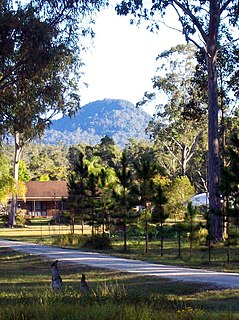
Glenugie Peak, also known as Mount Elaine or as Glen Ugie Peak, a mountain that is part of the ridge surrounding the Clarence Moreton Basin, is situated in the Northern Rivers region of New South Wales, Australia. At an elevation of 316 metres (1,037 ft) above sea level, the mountain is located near the Pacific Highway, south of the town of Grafton and approximately 6 kilometres (3.7 mi) west north-west of the locality of Calamia.

Archidendron hendersonii, the White Lace Flower or Tulip Siris is a rainforest tree in eastern Australia. A rare plant, listed as vulnerable. The plant is named after J.A. Henderson, who collected the original specimen at Ballina. It grows north from the Richmond River, New South Wales up to Cape Melville in tropical Queensland.
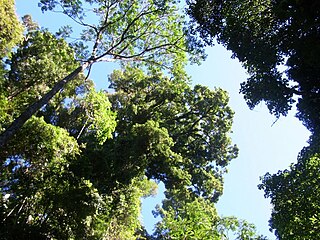
Daphnandra tenuipes, commonly known as the socket sassafrass, or red-flowered socketwood is a rainforest tree in eastern Australia. It grows on the more fertile basaltic and alluvial soils. Found from near Boorganna Nature Reserve near Taree, New South Wales to just over the border into Queensland at Springbrook National Park. It is a small to medium-sized tree featuring red new shoots and red flowers. It has dark green leaves which are lanceolate or ovate, and measure 4–13 cm (1.5–5 in) in length and 1.5–3 cm (0.59–1.18 in) wide.

Mount Royal is situated at the southern end of the Mount Royal Range in the Barrington Tops region of eastern Australia. It is part of the World Heritage Gondwana Rainforests of Australia.

Grundy Mountain or Mount Grundy, a mountain of the Great Dividing Range, is located on the Northern Tablelands of New South Wales, Australia.

Lomatia arborescens, commonly known as smooth lomatia or tree lomatia, is a shrub or small tree that grows at high altitudes, in and near rainforests. It is found north from the Barrington Tops area in eastern Australia.
Helicia ferruginea, commonly named hairy honeysuckle or rusty oak, is a species of rainforest trees, of eastern Australia, from the flowering plant family Proteaceae.


















